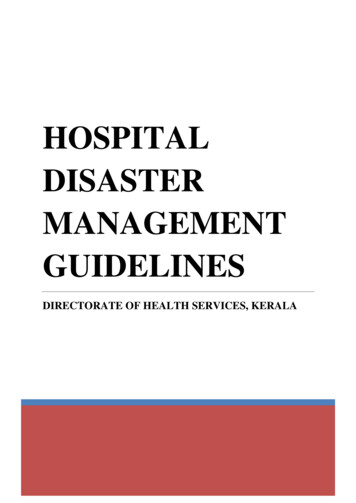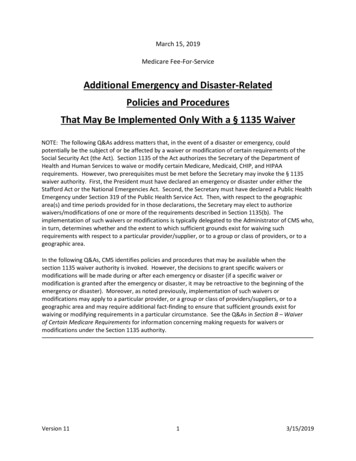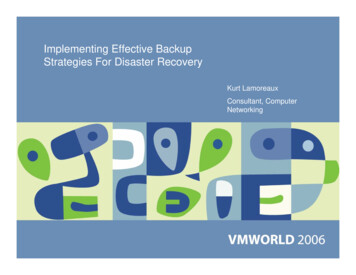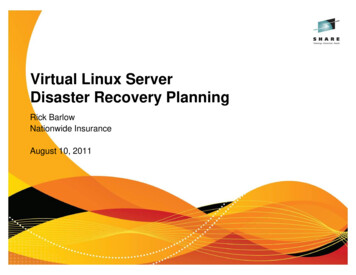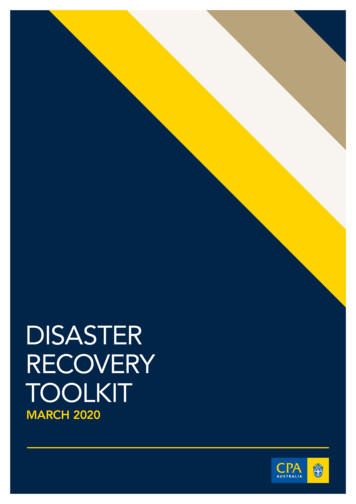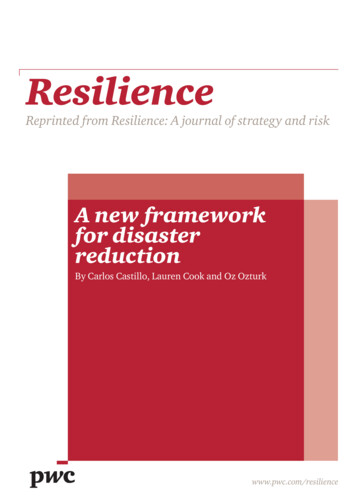
Transcription
ResilienceReprinted from Resilience: A journal of strategy and riskA new frameworkfor disasterreductionBy Carlos Castillo, Lauren Cook and Oz Ozturkwww.pwc.com/resilience
ContentsLetter from the publisherDennis Chesley01CEO perspectives on resilienceSteve Holliday, National Grid Group (UK)02Resilient CountriesResilience: What it is and why it’s neededLee Howell05Resilient MarketsHarnessing financial innovation to strengthen disaster resilienceErwann Michel-Kerjan08A new framework for disaster reductionCarlos Castillo, Lauren Cook and Oz Ozturk12CEO perspectives on resilienceShikha Sharma, Axis Bank Ltd (India)14Climate ChangeBusiness-not-as-usual:Tackling the impact of climate change on supply chain riskRichard Gledhill, Dan Hamza-Goodacre and Lit Ping Low15Sustainability in PECreating value through responsible investment:Are the hard and lean going soft?Shami Nissan and Malcolm Preston21CEO perspectives on resilienceSeymur Tari, Turkven (Turkey)25JapanBouncing back: Two Japanese corporations’ road to resilienceDavid Jansen and William Macmillan26EgyptEgypt: Weathering the stormRehab Abdelhafez31United StatesPicking up after Sandy: Resilience in the eye of the stormNeil Kaufman37CEO perspectives on resilienceJohn Koustas, Danaos Corporation (Greece)39Systemic ResilienceThe Long-Term ViewMarkets in PerilResilience practices: One-year follow-up analysis on Global Risks 2012 casesOverview41Case No. 1: The Seeds of Dystopia42Resilience in action: Tracking trends to challenge assumptions and steer the right course45Case No. 2: How Safe Are Our Safeguards?46Resilience in action: Taking advantage of windows of opportunity49Case No. 3: The Dark Side of Connectivity50Resilience in action: New behaviours for a new world52
A new framework for disasterreduction By Carlos Castillo, Lauren Cook and Oz OzturkPwC and UNISDR (the UN Office for Disaster Risk Reduction) aredeveloping a collaborative framework for disaster reductionintended to contribute to improved disaster resilience and provideeconomic, social and environmental benefits globally.The subtitle of this journal, ‘Winningwith risk,’ emphasises the opportunitiesthat arise from conflict and change. Butanother critical motivator of resilienceis risk-reduction. The stunning toll ofnatural disasters on lives, businessesand national economies has spikedinterest in finding ways to sustainablyreduce and manage disaster risk. In2011, in Thailand alone, floods shutdown 1,000 factories and forced morethan 700,000 people out of work. In2012, floods, typhoons andearthquakes caused more than 274billion of economic losses in Asia. InOctober 2012, when Hurricane Sandyravaged the North-Eastern UnitedStates coastline and impacted denselypopulated areas in its path, it was apowerful reminder to the public andprivate sectors, to governments andbusinesses alike, that is was time toact – together.In December 2012, the Business Councilfor the United Nations – supported byPwC – brought together representativesfrom both private and public sectors todiscuss “Disaster Risk Management:Preparedness and Resiliency.”Representatives from UNISDR, UNDP(United Nations DevelopmentProgramme), Wal-Mart, Citigroup andGovernment amongst others, sharedtheir views on how they are workingtogether to improve the resilience effortsof communities around the world.We define resilience as the ability torecognise, take, and rapidly andeffectively adapt to changes.1 In thecontext of disaster, preparedness fordifferent conclusions elevates the levelof resilience. There is not onepreparedness approach that will fit alloutcomes. However, there are somecommon preparedness techniques –communication among key officials inthe public and private sectors, testing ofinfrastructure, education efforts – thatcan be applied no matter thecircumstance.1 http://www.pwc.com/en es/resilience/assets/resilience-issue-2.pdf12 I Resilience: Winning with riskCarlos J. Castillo leads PwC’s disaster riskmanagement services for the public sector,providing homeland security and emergency anddisaster management advisory services to theFederal Government and others. A CertifiedEmergency Manager (CEM), Castillo brings morethan 30 years of emergency and disastermanagement experience at the local, state,Federal and international levels. Prior to joiningPwC, Castillo served as FEMA AssistantAdministrator and led the Disaster AssistanceDirectorate, responsible for the disasterdeclarations process, Individual Assistance, andPublic Assistance. Castillo has authored severalarticles on disaster management and lectures onthe topic internationally.Lauren Cook is a senior associate focused onissues of sustainability, corporate socialresponsibility and business interruption. Herwork at the firm has also included projects inBanking and Capital Markets and NationalAdvisory. As the current president of the NewYork City Green Team, she leads a growing teamof 150 members who are making a positiveimpact on the office, the surrounding communityand the environment.Oz Ozturk is a partner in PwC’s Consultingteam and is the global leader of the UNISDR &PwC initiative on establishing private and publicbest practices in disaster management andresilience. He leads the Strategy, Operations &Technology consulting group based in Geneva,specialising in Business Strategy andTransformation, Digital & Consumer Behaviour,and Supply Chain Optimisation. Ozturk holds aMaster’s degree from Stanford’s Graduate Schoolof Business and is a chartered accountant. He hasover 20 years experience in ManagementConsulting having worked for Coopers &Lybrand, IBM, and PwC in senior leadershippositions supporting his clients in a trustedadvisor capacity. In addition to his consultingexpertise, he has held executive positions withinindustry as a CEO and CIO within the logisticssector and as a Solutions Vice President for aglobal software company.
Figure 1 Disaster risk management frameworkBeing prepared saves lives,and moneyAccording to one panellist, “Forevery dollar spent on mitigationand preparedness activities theROI is between 4 and 11.”At either end of the range, theinvestment is worth it. Whilepreparedness efforts aren’t ashigh-profile or visible as responseand recovery efforts, they areultimately more effective.UNISDR and PwC – Working together to reduce disaster risksA framework to combat thedevastation before it startsPwC has been working with UNISDR forclose to a year to collect and analysedata about these preparednesstechniques and develop a frameworkthat can be applied around the world.The insights and best practices from thisglobal study will be used in conjunctionwith the UN’s 2013 Global Assessment ofRisk report to be published in May. ThePwC global study itself, led by PwCPartner Oz Ozturk, will be available as astandalone detailed report early thisyear. The findings will be used toestablish better alignment between theprivate and public sector for disasterprevention and set the scene for the soonto be updated Hyogo framework in 2015.As the number and severity of naturaldisasters increases at an alarming rate,this framework provides a pragmaticapproach to combat the devastatingimpact before it starts. At the event, I(Carlos Castillo) boldly claimed that, “alldisasters are preventable.” We say thisbecause we believe disasters can beprevented through risk-basedpreparedness and mitigation efforts,leading to enhanced resilience. Thepower of the PwC and UNISDRpartnership is that it incorporates allleading practices from the private sectoron a global scale with the UNISDRleading practices in community disasterrisk reduction.There is a clear benefit for the publicsector when it comes to thesepartnerships. As for corporate sectorparties, their increasinginterdependence with theircommunities and the public sectormeans they gain more than just goodPR from partnering with otherorganisations to create more resilientcommunities. Steve Dozier, VicePresident, Wal-Mart, highlighted this interms of the interdependence of itsassociates, stores and communitiesfollowing a disaster. He noted that themore rapidly their stores and otherbusinesses can reopen and providecritical goods and services following adisaster, the more resilient communitiesbecome. For communities to recoverquickly, Wal-Mart has to be prepared tosupport its own employees enablingthem to return to work sooner. Rapidrecovery also relies on the government’shelp when it comes to assisting theprivate sector with crucialinfrastructure needs.Partnerships that haveincreased each others’preparednessRecent examples of PPPs (Public PrivatePartnerships) provide realistic hope forthe success of the global framework.DHL against disasters – DHL instructedUN officials on how to prepare Beirut’sInternational Airport for naturaldisasters. Beirut has the onlyoperational commercial airport in thecountry, and the US had exports worthover a billion dollars to Lebanon in2011 alone.Joining forces in Florida – A USexample with global implications wasshared by Castillo from his experienceas Miami-Dade County’s, Florida,emergency management director. TheCounty formed alliances with localuniversities and corporations to hardentheir facilities against hurricanes,thereby reducing the need foradditional evacuation shelters forstudents and staff.Skilled up students – The Japanesegovernment taught junior high andelementary school students survivalskills that helped during the 2011Tsunami.Keeping money mobile – Citi’s mobilebanking was so user-friendly that itgenerated 10 million in transactionsduring Hurricane Sandy.Combining the intelligence andexperience underlying these examples,the PwC and UNISDR initiative seeksto produce an applicable globalframework – with possibly far-reachingeconomic, social and environmentalimplications – for preventing orrecovering from disaster.Resilience: Winning with risk I 13
ResilienceReprinted from Resilience: A journal of strategy and riskPublishersDennis ChesleyGlobal Risk Consulting LeaderPwC USMiles EversonUS Advisory Financial Services LeaderPwC USExecutive EditorsRobert G. EcclesProfessor of Management PracticeHarvard Business SchoolChristopher MichaelsonDirector, Strategy and Risk Institute, PwC Global AdvisoryAssociate Professor, University of St. Thomas Opus College of BusinessManaging EditorRania Adwan 1 (646) 471 5116rania.adwan@us.pwc.comPwC USProduction EditorShannon Schreibman 1 (646) 471 1102shannon.schreibman@us.pwc.comPwC USJuan PujadasVice Chairman, Global Advisory ServicesPricewaterhouseCoopers International Ltd.juan.pujadas@us.pwc.com 1 646 471 4000AuthorsCarlos CastilloPwC UScarlos.j.castillo@us.pwc.com 1 (703) 918 3127Lauren CookPwC USlauren.cook@us.pwc.com 1 (646) 471 5193Oz OzturkPwC Switzerlandoz.ozturk@ch.pwc.com 41 (58) 792 9037Special thanks to the following parties for their production and editorial assistance:John Ashworth, Chris Barbee, Lisa Cockette, Ashley Hislop, Angela Lang, Sarah McQuaid, Roxana Opris,Malcolm Preston, Alastair Rimmer, Suzanne Snowden, Tracy Fullham and Guatam Vermawww.pwc.comPwC helps organisations and individuals create the value they’re looking for. We’re a network of firms in 158 countries with more than 180,000 people who arecommitted to delivering quality in assurance, tax and advisory services. Tell us what matters to you and find out more by visiting us at www.pwc.com.This publication has been prepared for general guidance on matters of interest only, and does not constitute professional advice. You should not act upon theinformation contained in this publication without obtaining specific professional advice. No representation or warranty (express or implied) is given as to theaccuracy or completeness of the information contained in this publication, and, to the extent permitted by law, PwC does not accept or assume any liability,responsibility or duty of care for any consequences of you or anyone else acting, or refraining to act, in reliance on the information contained in this publicationor for any decision based on it. 2013 PwC. All rights reserved. PwC refers to the PwC network and/or one or more of its member firms, each of which is a separate legal entity.Please see www.pwc.com/structure for further details.DT-13-0064
Oz Ozturk PwC Switzerland oz.ozturk@ch.pwc.com 41 (58) 792 9037 www.pwc.com PwC helps organisations and individuals create the value they're looking for. We're a network of firms in 158 countries with more than 180,000 people who are committed to delivering quality in assurance, tax and advisory services. Tell us what matters to you and .

